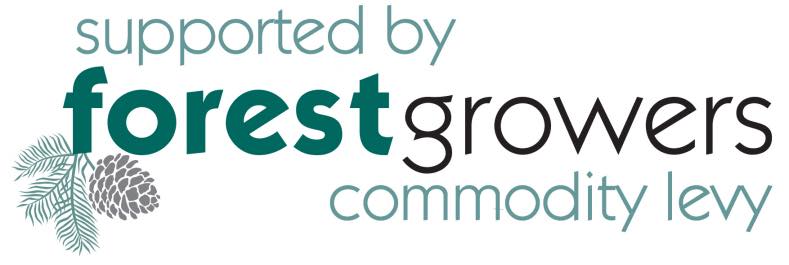
This is free.
Forest extension road shows
Hamish Levack, New Zealand Tree Grower May 2022.
In April last year the Minister of Forestry, Stuart Nash, announced that he was funding Te Uru Rakau – New Zealand Forest Service to lift its planning and advisory capabilities, to help with the ‘service’ offered by its
name. This was welcome news. It stimulated the Forest Investment Action Group to contact Te Uru Rakau and suggest a joint approach, because they had the budgets and we, the NZFFA, had the knowledge.
We felt that cooperation could provide useful synergies. Our postal and email address lists of smallscale forest owners could be used to invite NZFFA members, and through them their land owning neighbours, to regional workshops and field days where we could give them basic advice about afforestation.
Suitable members of the NZFFA in the regions might be willing to act as mentors for new growers, to present relevant information at the workshops and to show off their own well-managed, profitable woodlots. Such workshops and field trips could double as opportunities to raise awareness of the NZFFA and the wide array of relevant forestry information we have readily available on our website.
Selling the plan
We suggested three workshops to Te Uru Rakau as a ‘pilot’ for a wider programme later, and in our discussions we made it clear that we had a vested interest in the proposal. The involvement of our members in presenting these workshops and field trips would help lift the NZFFA’s profile and give us the opportunity to increase our membership.
Te Uru Rakau accepted the point. They would need to monitor and approve the content and style of the workshops to ensure they were of a suitable quality, that they provided useful information to the right audience,
and that they were suitably followed up to see what the audience did with the information.
Building on an earlier draft prepared in 2020, we began planning in July 2021. We discussed and agreed the objectives with Te Uru Rakau, entered into a draft Memorandum of Understanding, estimated the budget and in August applied for a supplementary grant from the Promotions Committee of the Forest Growers Levy Board. When Te Uru Rakau gave its final approval and offered the NZFFA a contract, the project had secured combined funding of a little over $96,000. That was when the work really began.
Farmers to grow trees
The aim is to attract farmers who are thinking of growing trees. A team from the NZFFA has pulled the material together, and Te Uru Rakau is taking care of publicity with Beef+Lamb and the land manager groups of the regional councils. Workshops will be held in Hawera, Bulls and Masterton.
Staff from Horizons, Greater Wellington Regional Council and Masterton District Council, as well as Beef+Lamb NZ are willing to participate and answer questions. Numbers will be limited to 100 for each venue with others able to attend on-line.
The basics for trees on farms
The content is designed to give land owners enough confidence in the basics of forestry for them to make decisions, and to look for further information and professional advice as they need it. Among other things, the workshops will cover planning, establishing, managing, harvesting and marketing a small forest. They will also cover species choice, indigenous forests, the Emissions Trading Scheme, He Waka Eke Noa and the on-farm benefits of afforestation, such as erosion control, flood and drought mitigation, shade and shelter and aesthetics. Government regulations, tax, funding, and financial modelling will also be touched on. The sessions promise to be quite intense.
After each one-day workshop there will be a half-day field trip where the attendees can talk to farm forestry members and touch and smell real trees. The trips will be run near the base locations and involve at least two
stops, one to discuss basic radiata pine forestry and one to consider alternative species, particularly poplars and willows.
The plan is to video each workshop and field trip, which should allow us to improve the format. If the pilot workshops are deemed successful, similar workshops and field trips may be rolled out across the country in other regions.

 Farm Forestry New Zealand
Farm Forestry New Zealand